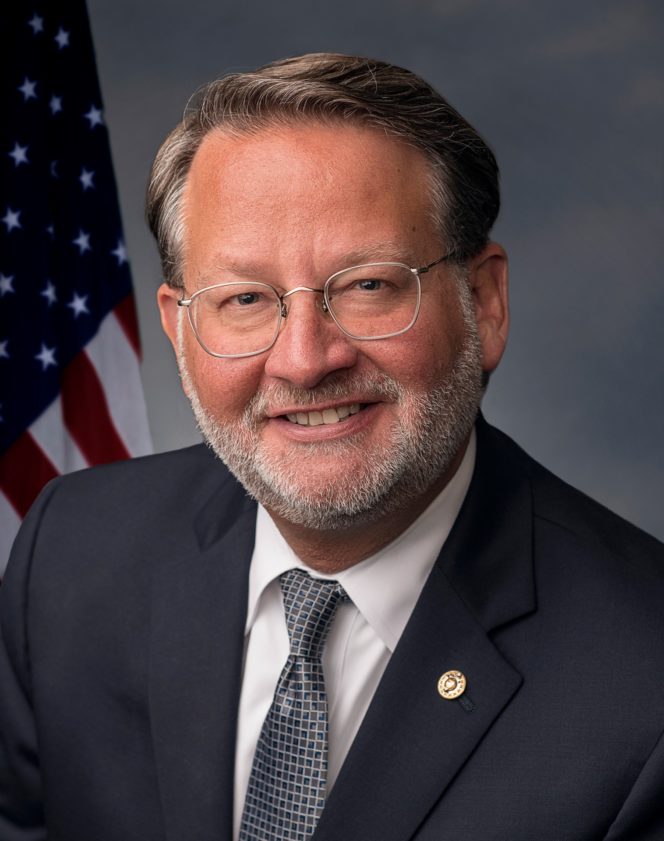CLEVELAND, OHIO (November 18, 2021) – Today the Great Lakes Maritime Task Force (GLMTF) recognized the tremendous work done by Michigan U.S. Senator Gary Peters for protecting and advancing the Great Lakes Navigation System.
Senator Peters has moved the needle on several extremely important projects in the Great Lakes. He continues to be instrumental in efficiently funding the construction of a new large navigational lock in Sault Ste Marie, Michigan. Senator Peters understands the economic benefits of Great Lakes shipping and the need to make our ports competitive and reliable even during the winter season. To that end, he cosponsored the “Great Lakes Winter Commerce Act” which would make icebreaking a higher priority for the U.S. Coast Guard and ensured $350 million was included in the pending House Reconciliation Bill for another heavy Great Lakes icebreaker. In addition, he has worked tirelessly with the Port of Monroe to resolve import and export issues associated with U.S. Customs and Border Protection’s interpretation of rules that hampered further port development with containerized cargo.
“The Great Lakes have and continue to be at the heart of Senator Peters’ leadership. His deckplate approach and unrelenting support have allowed the Port of Monroe to prosper while setting the course for our future as a sustainable seaport. I am humbly appreciative that the Senator’s efforts are being recognized with this award as his identity as a true champion of the Great Lakes maritime industry is rivaled only by the admiration we have for his efforts,” stated Paul LaMarre, GLMTF member and Port Director for Monroe, Michigan.
Senator Peters was a strong advocate for the passage of the Water Resources Development Act (WRDA) 2020 which ensures consistent funding from the Harbor Maintenance Trust for the U.S. Army Corps of Engineers. The funds are critical to maintaining the 60 federally-maintained deep-draft ports on the Great Lakes along with navigational structures which have suffered severe damage due to higher water levels.
The Senator has made protecting the Great Lakes one of his top priorities. In late 2020, he secured a bipartisan provision that was signed into law as part of the year-end funding bill to provide the first increase in the Great Lakes Restoration Initiative (GRLI) funding since the program was established in 2010. The GLRI is critical to cleaning up the Great Lakes and protecting them for future generations.
In addition, Senator Peters was able to get bipartisan legislation signed into law called the STORM Act to support local communities facing rising water levels, coastal erosion, and flooding that have put homes, property, and communities at risk. The bill authorizes FEMA to help states establish revolving loan funds that local governments could access to help mitigate the impacts of rising water levels, coastal erosion, and other natural disasters in a more cost-effective way. He secured an initial $500 million for the program in the bipartisan infrastructure bill. He also announced that the Coast Guard’s National Center of Expertise – which he envisioned, got signed into law and secured funding for – will be headquartered in Michigan at both Lake Superior State University and the Great Lakes Environmental Research Lab in Ann Arbor. The Center of Expertise will research and examine the impacts of oil spills in freshwater environments – for which there is little publicly available information on – and help develop effective responses.
Finally, Senator Peters introduced the “CADETS Act” in June 2021. The bill would expand the age eligibility for the Student Incentive Payment (SIP), which provides financial assistance to cadets who attend one of the six State Maritime Academies – including The Great Lakes Maritime Academy in Traverse City, Michigan. In return for their commitment to serve in the U.S. Navy Reserve at their time of graduation, cadets can receive up to $32,000 in incentive payments over four years to help offset the cost of tuition, uniforms, books, and living costs. “As a former Naval Reservist, Senator Peters recognizes the importance of this program to both the cadets and our national security,” noted Jim Weakley, GLMTF’s Vice President and co-chair of Great Lakes Maritime Academy’s Board of Visitors.
“The Great Lakes Maritime Task Force is grateful for Senator Peters’ leadership and ambition to ensure the Great Lakes remain protected and forever the pilot light of the North American economy. The Fourth Sea Coast needs relentless champions like Senator Peters,” stated John Clemons, President of the GLMTF.
“The Great Lakes are more than just an economic engine and ecological treasure: they are simply in our DNA as Michiganders,” said Senator Peters. “It’s critical we do everything in our power to protect and preserve the Great Lakes for future generations – and that’s always been my focus. I’m deeply honored to have earned this distinction and am thankful to have excellent partners like the Great Lakes Maritime Task Force that work tirelessly to improve the lives of Michiganders.”
About Great Lakes Maritime Task Force
The Great Lakes Maritime Task Force, with 74 members, is the largest coalition to speak for the Great Lakes Navigation System. Advocating for domestic and international shipping, its members represent labor and management from U.S.-flag vessel operators, shipboard and longshore unions, port authorities, cargo shippers, terminal operators, shipyards, and other Great Lakes interests. The Great Lakes commercial maritime industry supports more than 147,000 American jobs in eight Great Lakes states and generates more than $25 billion in economic activity.
